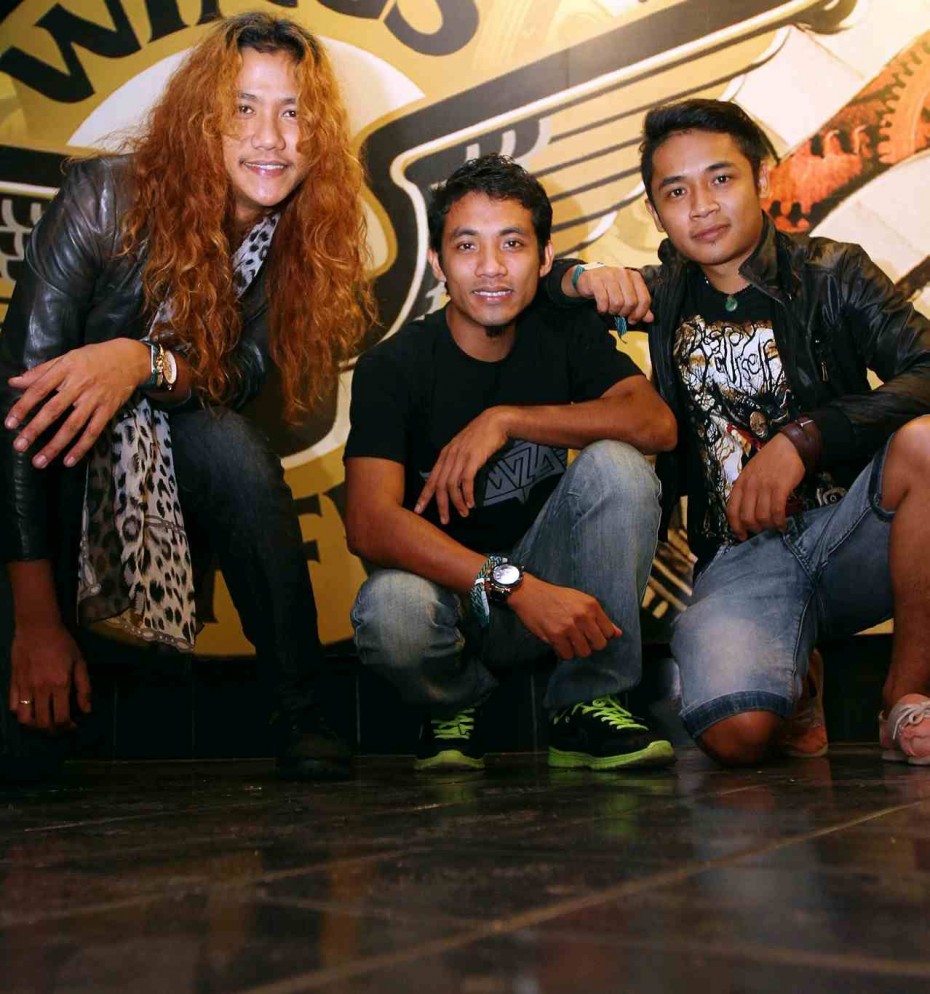BY BRYAN TERNG
alltherage@thestar.com.my
ROCK ‘n’ roll is here to stay,” sang Neil Young in his song, Hey Hey, My My (Into the Black). This was in the year 1979.
Thirty five years after the release of the song, rock ‘n’ roll in its purest form has waned. But stayed, it has, in the form of musicians who belt out rock classics at watering holes, where good tunes can always be enjoyed.
One of many rock bands that stands out among the rest is Muzza’s Mayhem, which recently won the Global Battle of the Bands (GBoB) Malaysia on Nov 15, held in conjunction with the Cyberjaya Creative Playground festival.

Three’s a charm: Muzza’s Mayhem comprises (left) lead vocalist/guitarist Muzaffar Shah, bassist Mohd Zikri Sahar and drummer Mohd Hafiz Khalil.
Banding together
The band’s members – comprising lead vocalist/guitarist Muzaffar Shah, bassist Mohd Zikri Sahar and drummer Mohd Hafiz Khalil – believe that the most important thing about being a musician is to stay humble.
“When we joined the competition, all we wanted to do was to show our talent and share our music,” said the band’s frontman, who prefers to be called Muzza.
Unexpectedly, the band admitted to having barely practised for the competition.
“Just before the first round of GBoB, we only rehearsed for two hours on the day itself,” Muzza said.
And from that day onwards, the members didn’t practise at all, not even for the final round. In fact, they only briefly had a discussion about their performance before taking to the stage!
A strange twist of fate
The band decided to take part in GBoB after its manager, May Haizura told them about the competition. May also happens to be Muzza’s wife of three years.
Funnily enough, Muzza’s band was also formed three years ago.
Why the coincidence? It’s because Zikri and Hafiz performed at Muzza and May’s wedding … in a different band at the time, of course.
When they performed, Muzza noticed that the two of them were competent with their instruments.
“On the day itself, I went up to them and asked them to form a band with me,” Muzza mused. “They agreed, and we eventually became friends.”
Fortunately, it wasn’t a problem for the duo to leave their previous band.
“As artistes, each of us understood that we’d have to go in the direction that would lead us towards becoming better musicians,” said Hafiz.
Taking the stage
Even though they have performed together for years, the guys still get butterflies in their stomachs every time they hit the stage.
But that doesn’t mean stage fright is a bad thing.
“On the contrary, I love the feeling when my hands start to shake,” Muzza said. “Being nervous reminds us to not be overconfident and do everything right on stage.”
Muzza’s take on stage performance was probably handed down to him by his parents, who were themselves deeply entrenched in the music business at one point. His father – guitarist Asrinan Misran (or Lolen) and mother – vocalist, Norizan Mohd – were members of one of the longest-running bands in Malaysia, Heavy Machine (the band still performs, but with a different line-up).
Given the experience the band has accumulated, Muzza’s tip for aspiring musicians is to love what they do and play with their hearts.
“And also, keep practising,” he added. “It’ll improve your band’s overall performance.”
But most importantly, the trio advised to “never be arrogant”. Muzza explained that a musician must be humble to survive in the music scene, because it’ll be easier to connect with other people.
Want to watch Muzza’s Mayhem live? Catch them at On Line Pub, Damansara Kim, on Fridays, at 10pm.







Tell us what you think!